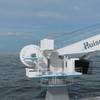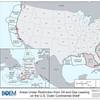The Baltic Exchange -- the world's oldest shipping market -- is seeking mutual status as a means to overcome conflicts between shareholders over the use of assets. "The board feels that a company moving toward mutual mode is the best for the future of the Baltic Exchange," chairman Hugh McCoy said.
Under proposals to be put out for consultation, the shipping market would be restructured so that existing shareholders became members of a new corporate body limited by guarantee. A one-off dividend would be paid to existing shareholders with remaining assets transferred to allow the new company to continue operating the market for trading members. The proposals were designed to end conflict between existing shareholders and trading members, McCoy said.
"Some shareholders regard the Baltic Exchange as a commercial business from which they should get a commercial return, while others believe it should serve the maritime community and represent all interests," McCoy said. The board respected both views, he said.
"The aim is to resolve tensions by recognizing shareholder value in return for a new constitution," McCoy said.
Members of the new company would pay an annual subscription with companies able to vote at general meetings in proportion to their number of subscriptions, but no shares would be issued. Tensions had arisen from different opinions as to how to use the 27 million pound insurance payment from the IRA bombing of the old exchange in 1992.
Currently shares, which were a passport to membership of the exchange, passed hands at a nominal 10 pounds each.
Changes in company and family ownership meant some individual members no longer traded but could hold up to a maximum of 1,500 shares. Some companies had members holding large numbers of shares. The Baltic currently has 679 shareholders and 1,421 individual members but 20 groups controlled 49 percent of the shares, McCoy said.
A previous management study that had recommended a large dividend payment and a scaled-down exchange was rejected in 1997. The consultative process would be aimed settling a balanced dividend payment level which left sufficient funds to allow the Baltic Exchange to continue as a trading body, McCoy said.
A report would be made to the board by November and a decision on whether to go ahead made by the new year.
McCoy said the cost of transferring status would be about 250,000 pounds. A smaller executive - about half the size of the current 15-strong board would be created under the plans.
Featured videos

Xenos Marine Takes Aim at the Gulf Salvage, Decommissioning Markets

AI to the Rescue: Zelim’s ZOE to be Installed on Cruise Ship
April 2025
 Read the Magazine
Read the Magazine

 Read the Magazine
Read the Magazine
This issue sponsored by:

Near Miss Reporting – Training Mariners to Speak Up
Subscribe for
Maritime Reporter E-News
Maritime Reporter E-News is the maritime industry's largest circulation and most authoritative ENews Service, delivered to your Email five times per week









